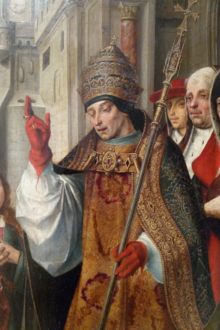Pope Siricius
|
Pope Saint Siricius |
|
|---|---|

A detail of the Saint Auta Reredos depicting the Pope (referenced as Cyriacus in the legend of Saint Ursula). National Museum of Ancient Art, Lisbon, Portugal.
|
|
| Papacy began | December 384 |
| Papacy ended | 26 November 399 |
| Predecessor | Damasus I |
| Successor | Anastasius I |
| Personal details | |
| Birth name | Siricius |
| Born | 334 |
| Died | 26 November 399 |
| Sainthood | |
| Feast day | 26 November |
|
Papal styles of Pope Siricius |
|
|---|---|
 |
|
| Reference style | His Holiness |
| Spoken style | Your Holiness |
| Religious style | Holy Father |
| Posthumous style | Saint |
Pope Siricius (334 – 26 November 399) was the Pope from December 384 to his death in 399. He was successor to Pope Damasus I and was himself succeeded by Pope Anastasius I.
Siricius was elected Bishop of Rome unanimously, despite attempts by the Antipope Ursinus to promote himself. He was an active Pope, involved in the administration of the Church and the handling of various factions and viewpoints within it. He was the first Pope to issue decretals, the first of which was the Directa Decretal sent to Himerius of Tarragona. He was the author of two decrees concerning clerical celibacy. According to the life in the "Liber Pontificalis" (ed. Duchesne, I, 216), Siricius also took severe measures against the Manichæans at Rome. However, as Duchesne remarks (loc. cit., notes) it cannot be assumed from the writings of the converted Augustine, who was a Manichæan when he went to Rome (383), that Siricius took any particular steps against them, yet Augustine would certainly have commented on this if such had been the case. The mention in the "Liber Pontificalis" belongs properly to the life of Pope Leo I. Neither is it probable, as Langen thinks (Gesch. der röm. Kirche, I, 633), that Priscillians are to be understood by this mention of Manichæans, although probably Priscillians were at times called Manichæans in the writings of that age. The western emperors, including Honorius and Valentinian III, issued laws against the Manichæans, whom they declared to be political offenders, and took severe action against the members of this sect (Codex Theodosian, XVI, V, various laws). In the East Siricius interposed to settle the Meletian schism at Antioch; this schism had continued notwithstanding the death in 381 of Meletius at the Council of Constantinople. The followers of Meletius elected Flavian as his successor, while the adherents of Bishop Paulinus, after the death of this bishop (388), elected Evagrius. Evagrius died in 392 and through Flavian's management no successor was elected. By the mediation of St. John Chrysostom and Theophilus of Alexandria an embassy, led by Bishop Acacius of Beroea, was sent to Rome to persuade Siricius to recognize Flavian and to readmit him to communion with the Church. When the Spanish bishop and ascetic Priscillian, accused by his fellow bishops of heresy, was executed by the emperor Magnus Maximus under the charge of magic, Siricius—along with Ambrose of Milan and Martin of Tours—protested against this verdict.
...
Wikipedia
